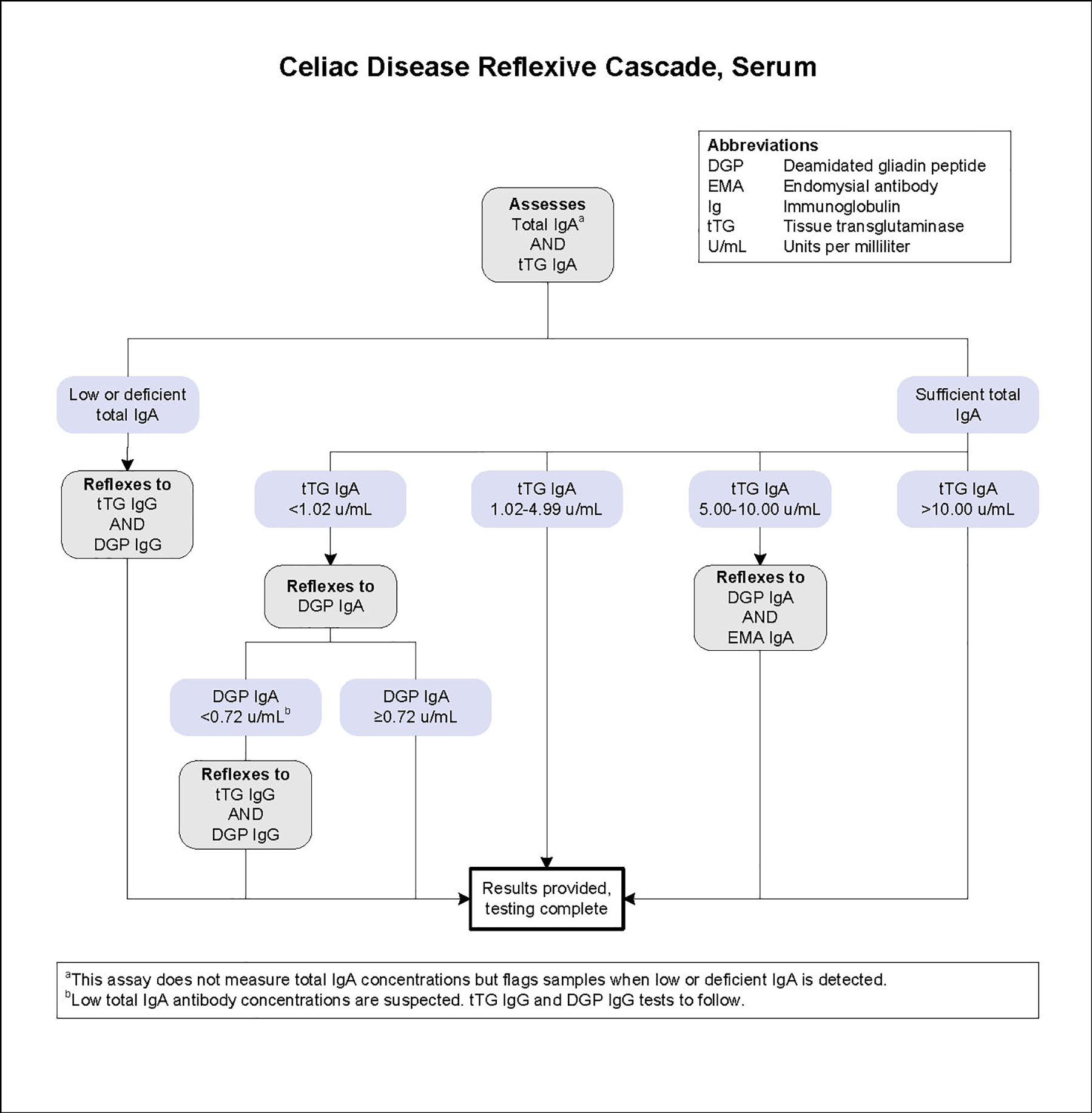Semi-Quantitative Particle-Based Multianalyte Technology (PMAT)
Celiac disease (CD) is a nonallergic, immune-mediated sensitivity to gluten characterized by small intestinal damage and a range of gastrointestinal and extraintestinal manifestations (eg, dermatitis herpetiformis [DH], restricted growth, peripheral neuropathy, etc.). A combination of serologic and histologic testing is recommended to confirm a diagnosis of CD. The most sensitive and specific biomarker for CD in immunoglobulin A (IgA) competent individuals is tissue transglutaminase (tTG) IgA. In those with selective IgA deficiency (ie, undetectable IgA concentrations), IgG serologies should be performed. All serologies should occur while the patient is consuming a regular, gluten-containing diet to ensure accurate results.
For more information on the testing strategy for CD, refer to the ARUP Consult Celiac Disease topic.
Test Interpretation
Reflex Pattern

Results
| Antibody | Interpretation |
|---|---|
|
tTG IgA |
The presence of tTG IgA antibody is associated with gluten-sensitive enteropathies such as CD and DH. Individuals with positive results should be confirmed with small intestinal biopsy to establish CD diagnosis. tTG IgA antibody concentrations >50 U/mL exhibits higher correlation with results of duodenal biopsies consistent with CD. For antibody concentrations ≥5 U/mL but <10 U/mL, additional testing for EMA IgA concentrations may improve the positive predictive value for disease. A decrease in tTG IgA antibody concentration after initiation of a gluten-free diet may indicate a response to therapy. |
|
DGP IgA |
A positive DGP IgA antibody result is associated with CD but is not to be used as an initial screening test due to its low specificity and only occasional positivity in CD patients who are negative for tTG IgA antibody. |
|
tTG IgG and DGP IgG |
In individuals with low or deficient IgA, testing for tTG and DGP antibodies of the IgG isotype is performed. A positive tTG and/or DGP IgG antibody result indicates CD; however, small intestinal biopsy is required to establish a diagnosis due to the lower accuracy of these markers, especially in patients without IgA deficiency. |
|
DGP, deamidated gliadin peptide; DH, dermatitis herpetiformis; EMA, endomysial antibody |
|
Limitations
- Negative test results do not rule out the possibility of CD.
- Patients must be consuming a gluten-containing diet at the time of testing.
- Previous test results obtained by enzyme-linked immunosorbent assay (ELISA) cannot be used interchangeably with results achieved by particle-based multianalyte technology (PMAT).
References
-
36602836
Rubio-Tapia A, Hill ID, Semrad C, et al. American College of Gastroenterology guidelines update: diagnosis and management of celiac disease. Am J Gastroenterol. 2023;118(1):59-76.
-
31568151
Husby S, Koletzko S, Korponay-Szabó I, et al. European Society Paediatric Gastroenterology, Hepatology and Nutrition guidelines for diagnosing coeliac disease 2020. J Pediatr Gastroenterol Nutr. 2020;70(1):141-156.
-
30578783
Husby S, Murray JA, Katzka DA. AGA clincal practice update on diagnosis and monitoring of celiac disease-changing utility of serology and histologic measures: expert review. Gastroenterology. 2019;156(4):885-889.



 Feedback
Feedback
Preferred reflex test to evaluate individuals with suspected celiac disease (CD). May be used to assess for CD in individuals at increased risk of the disease. May also be used in conjunction with immunobullous antibody panel testing to assess for dermatitis herpetiformis (DH).